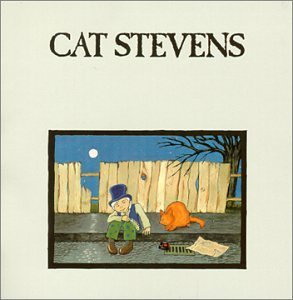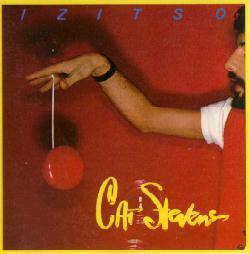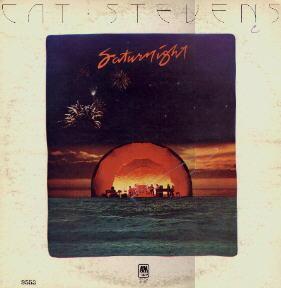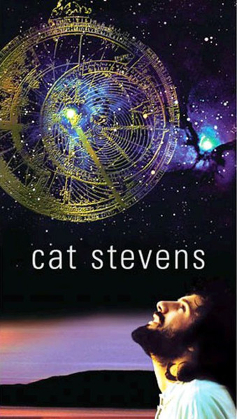
Yusuf Islam, commonly known by his stage names Cat Stevens, Yusuf, and Yusuf / Cat Stevens, is a British singer-songwriter and musician. He has sold more than 100 million records and has more than two billion streams. His musical style consists of folk, rock, pop, and, later in his career, Islamic music. Following two decades in which he performed only music which met strict religious standards, he returned to making secular music in 2006. He was inducted into the Rock and Roll Hall of Fame in 2014. He has received two honorary doctorates and awards for promoting peace as well as other humanitarian awards.

Tea for the Tillerman is the fourth studio album by singer-songwriter Cat Stevens, released in November 1970.

Mona Bone Jakon is the third studio album by singer-songwriter Cat Stevens, released in April 1970 on the Island Records label in the United Kingdom and on A&M in the United States and Canada.

Teaser and the Firecat is the fifth studio album by Cat Stevens, released in October 1971.

Catch Bull at Four is the sixth studio album by Cat Stevens. The title is taken from one of the Ten Bulls of Zen.

Foreigner is the seventh studio album released by British-Emirati singer-songwriter Cat Stevens in July 1973. In addition to the minor hit "The Hurt", which received a moderate amount of airplay, Foreigner also included such songs as "100 I Dream" and the 18-minute-long "Foreigner Suite", which took up the entirety of side one.

Izitso is the tenth studio album by the British singer-songwriter Cat Stevens, released in April 1977. After the lacklustre Numbers, the album proved to be his comeback. The album updated the rhythmic folk rock and pop rock style of his earlier albums with the extensive use of synthesizers and other electronic music instruments, giving the album a more electronic rock and synthpop style, and anticipating elements of electro.

Numbers is the ninth studio album, and the first concept album by singer/songwriter Cat Stevens released in November 1975.

Saturnight is the first live album by Cat Stevens, released only in Japan. Proceeds from the album went to support UNICEF.

Majikat is a CD and DVD live album by British singer-songwriter Cat Stevens. It was recorded during the US leg of Stevens' Earth Tour 1976, but was not released until 2004, by which time the artist was known as Yusuf Islam.

An Other Cup is the twelfth studio album by Yusuf, released on 10 November 2006 in Germany, 13 November in the UK and the US and worldwide on 14 November. It is Yusuf's first Western pop album since Back to Earth, which was released in 1978 under the name Cat Stevens. An Other Cup is the artist's first studio album under the name Yusuf. It heralded his return to Western pop music.

Say It Ain't So is the second studio album by Murray Head. It was released in 1975 on A&M Records. The album was produced by Paul Samwell-Smith, and the album features sleeve photography by Gered Mankowitz.
Alun Davies is a Welsh guitarist, studio musician, recording artist, and composer who rose to fame primarily with his supporting guitar work and backing vocals as accompanist for English musician Cat Stevens, from early 1970 to 1977.

At the End of a Perfect Day is singer Chris de Burgh's third album, released in 1977.

"Lady D'Arbanville" is a song written and recorded by Cat Stevens and released in April 1970. It subsequently appeared on his third album, Mona Bone Jakon, released later that year. It was his first single released after signing a contract with Island Records, with the encouragement of his new producer, Paul Samwell-Smith, fostering a folk rock direction. "Lady D'Arbanville" has a madrigal sound, and was written about Stevens' former girlfriend, Patti D'Arbanville, metaphorically laying her to rest.

Roadsinger is the thirteenth studio album by Yusuf. Roadsinger is Yusuf's second mainstream release since his return to music. The album made its debut on the US Billboard 200 at position No. 41 and on the UK Albums Chart at No. 10.

A Sideman's Journey is the first solo album by German musician and artist Klaus Voormann, released in July 2009. Voormann is best known as the creator of the cover art for The Beatles' album Revolver as well as for being a much-in-demand session musician during the 1970s. He played bass on a large number of well-known albums by ex-Beatles John Lennon, George Harrison and Ringo Starr − including All Things Must Pass, Imagine and The Concert for Bangladesh − and by artists such as Harry Nilsson, Doris Troy, Lou Reed, Gary Wright, Carly Simon and Randy Newman. Before then, Voormann had been a member of the 1960s pop group Manfred Mann. A Sideman's Journey is notable for including performances by Paul McCartney, Ringo Starr and Yusuf Islam, among others.

Tea for the Tillerman 2 is the sixteenth studio album by singer-songwriter Yusuf / Cat Stevens, released on 18 September 2020 by Cat-O-Log Records through Island. It is a re-imagining of his hit 1970 album Tea for the Tillerman.

King of a Land is the seventeenth studio album from British singer-songwriter Yusuf / Cat Stevens, released on 16 June 2023 by BMG Rights Management / Dark Horse Records. The recording featured children's music and religious music influences, and received positive reviews from critics.

Cat Stevens is a four-disc box set by British singer-songwriter Cat Stevens/Yusuf Islam. Released on October 30th, 2001, it features 79 tracks—hits, B-sides, live tracks and previously unreleased material from his tenures on Deram and Island/A&M Records—spanning his career from 1965 to 1978, plus one track from 1997 recorded as 'Yusuf'.



















